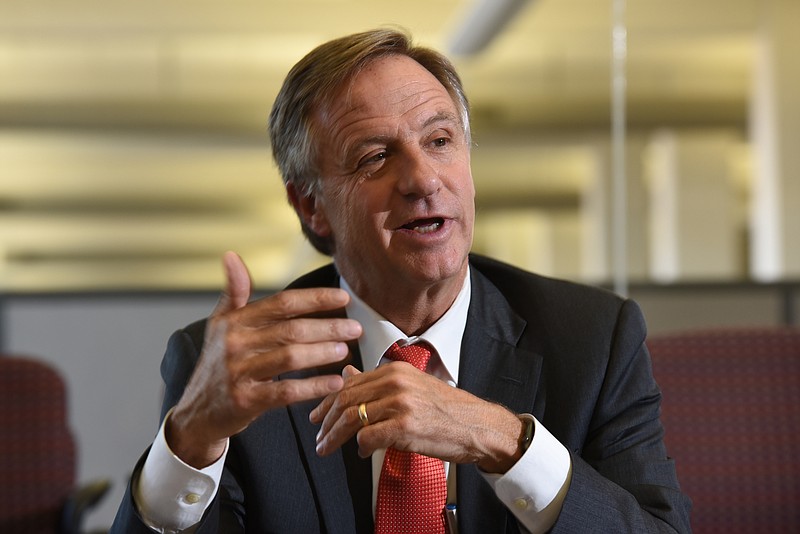NASHVILLE - Tennessee lawmakers took final action Monday night on the state's $37.1 billion annual spending plan as the Senate voted to send the measure to Republican Gov. Bill Haslam to sign.
The vote was 28-2.
"Who speaks for the future of this state? We do," Senate Majority Leader Mark Norris, R-Collierville, told the chamber, outlining tax cuts, investments in capital improvements, increases in K-12, and higher education and other areas. "It matters who governs."
The budget acknowledges a nearly $1 billion surplus in recurring revenues and more than $1 billion in one-time revenue.
Norris pointed to the $257 million in tax cuts reflected in the appropriations bill that include a 20 percent cut in food sales tax, reductions in business franchise and excise taxes, and a continuing phase-out of the Hall Income Tax.
It also includes $150 million for state road needs, courtesy of Haslam's IMPROVE Act, which raises fuel taxes over the next three years while cutting other taxes that support the state's general fund.
The budget also provides for $127 million in state spending cuts and socks away another $132 million in the state's Rainy Day Fund, which will bring the emergency reserve fund to $800 million by June 30, 2018. Combined with the TennCare reserve fund, that would bring state reserves to $1 billion.
Norris also pointed to provisions to hire 25 new state troopers and noted the budget also adds new local prosecutors and public defenders, boosts in Department of Intellectual and Developmental Disability rates for private providers, and a boost in reimbursements to local jails for housing state felons.
Other provisions include $11.8 million set aside to pay the Tennessee Valley Authority for lost electric power revenues over the next 20 years on the Ocoee River because the federal utility allows the river to run free for about half the year for whitewater enthusiasts and commercial rafting companies.
And the Chattanooga Zoo and Tennessee Aquarium will each receive $200,000 grants in the new fiscal year that takes effect July 1.
Senators engaged in a spirited debate over the state busting the "Copeland Cap," a state constitutional provision named after former Rep. David Copeland, R-Collegedale. It says the percentage of growth in Tennessee government revenues cannot exceed the percentage of per capita income as measured by Tennesseans' personal income.
That is, lawmakers can't exceed the percentage unless they specifically acknowledge they're doing it in the stand-alone bill. Senate leaders say the cap is being busted in the current budget year as the state acknowledged budget surpluses from the Fiscal Year 2016 and the current FY 2017. It goes away in the FY 2018 budget that goes into effect this July 1.
But the busting of the cap again drew criticism from Sen. Todd Gardenhire, R-Chattanooga, who knows Copeland, as well as from Senate Minority Leader Lee Harris, D-Memphis, who unsuccessfully sought to force a vote on the indexing provision before the appropriations bill.
Senate Finance Committee Chairman Bo Watson, R-Hixson, noted that Copeland had twice voted to acknowledge the state was busting the cap back in 1989.
That, Watson said, demonstrates the provision was intended not as a bar to exceeding the revenue cap but to make them think hard before doing so through the separate acknowledgment vote.
Senate debate over the Copeland Cap provision was far less volatile than the budget meltdown that occurred last week in the House, where multiple GOP majority factions have spurred any number of problems.
In the House, a coalition of hard-right Republicans and Democrats found common cause to, in the words of one critic, "hijack" the state's budget last Thursday.
That resulted in hundreds of millions of dollars in amendments being added to the bill. A day later, the badly divided House's issues were resolved by diverting Haslam's last-minute proposed $55 million one-time addition for state roads over to Tennessee's 95 counties' road programs.
Lt. Gov. Randy McNally, R-Oak Ridge, and colleagues readily accepted the minor change in a budget with some $17 billion in state spending, with the remainder provided by Uncle Sam, student tuition and other programs.
"This budget funds priorities that matter to Tennesseans," McNally, the Senate speaker, said in a statement. "It provides funds for our teachers, our veterans, our state employees and our roads. And we have funded important measures to keep our citizens safe. We have done all this while cutting taxes and keeping our road fund sustainable and debt-free."
With the budget behind them, lawmakers are working furiously on the remaining bills and, barring blow-ups, hope to adjourn their annual session either today or Wednesday.
Contact staff writer Andy Sher at asher@timesfreepress.com or 615-255-0550. Follow him on Twitter @AndySher1.
